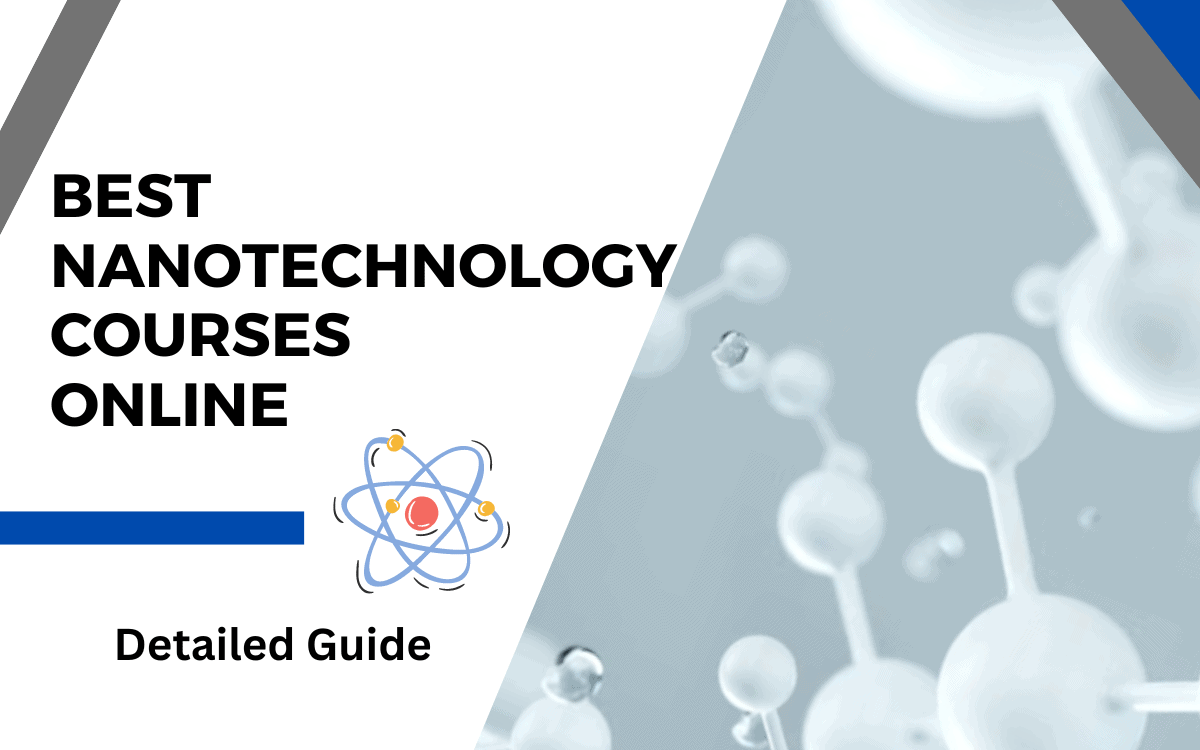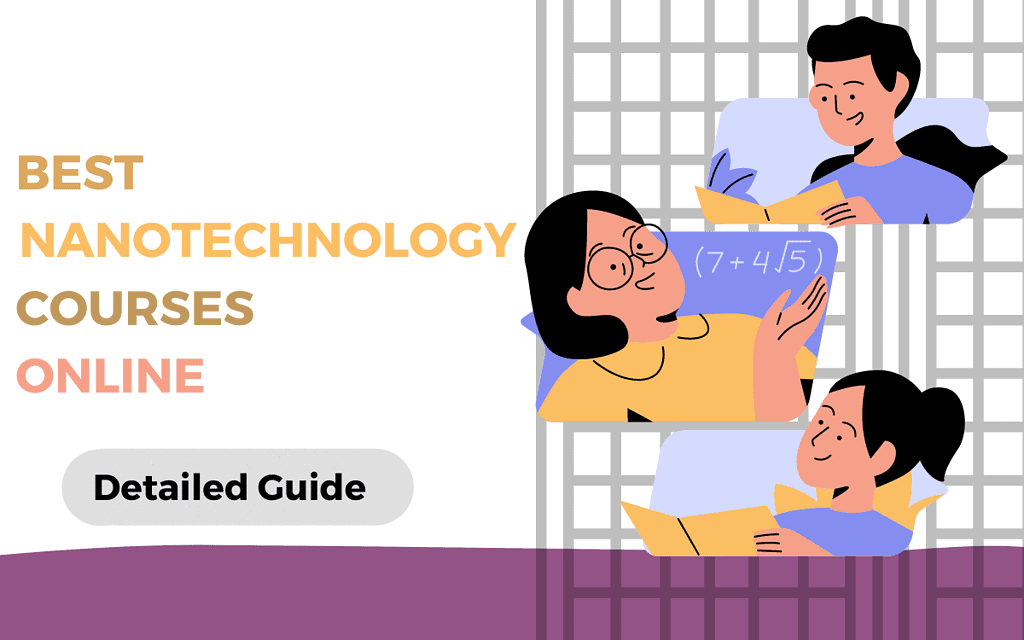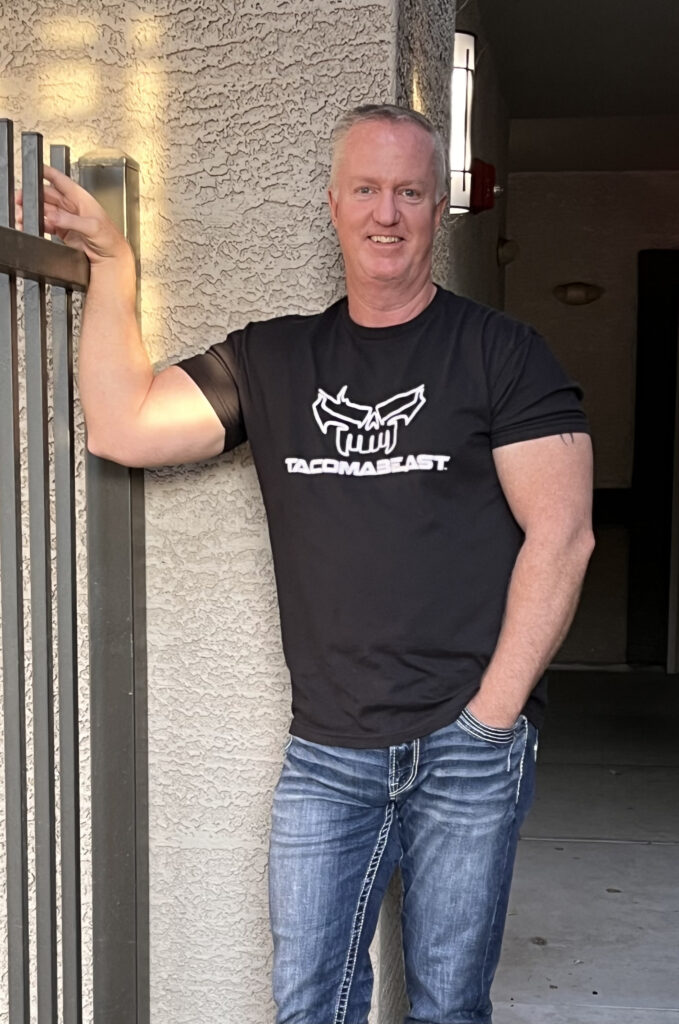9 Best Nanotechnology Courses Online a Detailed Guide with Reviews

Nanoscience and nanotechnology are now at the core of our daily activities. Whether medical, education, engineering, or manufacturing, nanotechnology is rocking and making things advanced and more manageable. With the increasing demand for nanotechnologists, we’ve covered a detailed guide to the best nanotechnology courses online best suited for all levels of learners.
What is Nanotechnology, and Why is it Important?

Udemy
This online nanotechnology course is a complete package to learn nanotechnology, fabrications, nanosensors, nano degrees, and simulation. This course covers all the aspects of nanotechnology in a simple language that beginners understand.

EDX
Advance your education, enroll in this nanotechnology master’s degree program. This course covers the essentials of physics and modern nanoscale transistors. Besides, you will learn how to design high-performance nanoelectronics and more.

Coursera
This course provides an overview of the basic concepts of nanomaterials and nanotechnology with their crucial environmental applications. Hands-on experience and knowledge of fabrication, nanosensors, and manipulation of nanomaterials.
Nanotechnology is studying and manipulating matter at the atomic and molecular levels. It is a rapidly emerging field with many potential applications, including medicine, manufacturing, and energy production.
Nanotechnology promises to revolutionize many industries and enhance the quality of life. For instance, medicine uses nanotechnology to develop innovative therapies and medical diagnostic tools. In manufacturing, it is being used to create better materials. And energy production is being used to develop more efficient solar cells and batteries.
There are many reasons why nanotechnology is essential. It can solve some of the world’s most pressing problems and is already starting to impact several industries significantly. With continued research and development, nanotechnology is likely to have an even more significant impact in the years to come.
Here is our Detailed Review of the Best Nanotechnology Courses Online
After thorough research and expert recommendations, here are the best nanotechnology courses online.
Nanotechnology: A Maker’s Course By Coursera
This nanotechnology course will provide hands-on theoretical knowledge of nanotechnology tools and procedures for characterization and fabrication, combining lab instructions with demonstrations.
The course is affiliated with Duke University, North California State University, and The University of North California at Chapel Hill, so get ready to get hands-on learning from experts.
Who Is Suitable For This Course?
It is an introductory-level course where you will learn the basics of nano-characterization and nano-fabrication technologies. You will also learn the primary applications of commercial products in nanotechnology fields. Moreover, students with an electrical engineering background will better grasp materials science.
What Are The Features & Course Content?
- The three significant universities’ tutors power this nanotechnology course and provide fundamental principles, keeping beginners in mind.
- The course covers characterization tools in-depth for better understanding.
- The etching section highlights the dry and wet etching procedures in nano-fabrication.
- You will also learn the five methods for sensing properties, patterning, and self-assembly.
- Compare chemical vapor deposition, atomic layer deposition, and plasma-enhanced chemical vapor deposition.
What Are The Duration And Price?
The course takes 26 hours and is 100% online with flexible deadlines. Another best part of this course is the availability of subtitles in multiple languages, including Vietnamese, French, Arabic, English, Portuguese, Italian, German, Spanish, and Russian.
You can join this course for free whenever you want. However, access to learning material will be limited. Contact customer support for lifetime access.
Pros & Cons – Is It Worth Spending?
Pros:
- Free access to learning material
- Subtitles available in multiple languages
- Affiliated with top universities
- Shareable certification on completion
- Flexible deadlines and 100% online
Cons:
- Hidden course price
What Are People Saying – Reviews
Overall, 56,312 students have enrolled in this course. 2,694 learners have rated the system with a 4.8-star rating. The majority are delighted with the course outline and instructors. However, they demand to unhide the fee.
Fundamentals of Nanomaterials and Nanotechnology
Purdue University is a famous university in Indiana, well-known for its ambiance and highly educational approach. By joining this best nanotechnology online course, you will understand nanomaterials’ application in environmental engineering and civil.
The particular emphasis of this course is on characterizations, nanomaterials synthesis, and their applications.
Who Is Suitable For This Course?
This online course for nanotechnology is best suited for beginners. The basic concepts include:
- Process-structure-property relationship
- Nanoscale effect
- Nano and micro-structure property characterizations
- Nano-device fabrication
- Multi-functional materials
- Water filtration
- Energy harvesting applications.
What Are The Features & Course Content?
- This course highlights the basics of nanostructures and nanomaterials in-depth.
- You will learn the practical implementations of nanomaterials to get hands-on skills in micro-structure characterizations.
- You will learn the methods for nanomaterial fabrication and techniques for martial characterization.
- The course has five outlines divided into five weeks to ensure every student gets hands-on materials science knowledge.
What Are The Duration And Price?
This nanotechnology course lasts five weeks, with 2-3 hours of lectures weekly. The assignments, tests, and deadlines are instructor-paced; ensure you complete your attendance. You can enroll for free, however, with limited access. Customer support will disclose the price curriculum.
Pros & Cons – Is It Worth Spending?
Pros:
- Availability of free educational material
- Affiliated with Purdue University
- Shareable certification on completion
- Introductory-level course with in-depth knowledge
- Hands-on practicals improve your skills.
Cons:
- Learners from Cuba, Iran, and the Crimea region of Ukraine can’t enroll in the course.
What Are People Saying – Reviews
This nanotechnology course is necessary for a hands-on understanding of nanomaterials with practicals. More than just the basic concepts, learners get to explore the fields of nanoscience and their applications in our daily lives.
Nanotechnology: Introduction, Essentials, and Opportunities
This online nanotechnology course is a complete package to learn nanotechnology, fabrications, nanosensors, nano degrees, and simulation. This course covers all the aspects of nanotechnology in a simple language that beginners understand.
The researchers will introduce external resources to discover the latest achievements in the field and explore job opportunities per one’s interest.
Who Is Suitable For This Course?
It is an intermediate-level course that covers every aspect of nanotechnology and nanoscience. The ideal students for this course must have heard or learned the basics of nanotechnology. However, everyone is welcome to this course to discover the world of nanoscience.
What Are The Features & Course Content?
- Learn what nanotechnology is and how it can unlock potential doors of success.
- Learn in-depth about nanomaterials, like Graphene, Quantum Dots, Carbon Nanotubes, and Buckyballs via a fascinating journey.
- You will learn what makes nanotechnology unique and how the nanomaterials and their properties will lead to innovative inventions, solutions, and products.
- You will learn fabrication and nanosystems with practical implementations and lithography methods like Scanning Probes, Electron beams, X-rays, Nanoimprints, and Dip Pens.
- Besides education, the teachers will guide the students on the paths they should choose to unlock success.
What Are The Duration And Price?
This course includes 4.5 hours of on-demand videos with 16 articles. The premium package will have eight downloadable resources with lifetime access. The price of the course is $84.99.
Pros & Cons – Is It Worth Spending?
Pros:
- Full lifetime access
- Certificate of completion
- Access on TV and mobile
- 30-day money-back guarantee
- Career guidance, along with teaching
Cons:
- Pricey
What Are People Saying – Reviews
More than the learning program and material, students are happy with career guidance. The teachers ensure the students unlock potential success doors after completing this course and make a comfortable living.
MicroMasters® Program in Nanoscience and Technology
If you have completed your bachelor’s degree and are looking for another option to advance your education, enroll in this nanotechnology master’s degree program. This course covers the essentials of physics and modern nanoscale transistors. Besides, you will learn how to design high-performance nanoelectronics and more.
Who Is Suitable For This Course?
It is an advanced-level course program, so you must have a bachelor’s degree. This course program ranks among the best online courses- thanks to its in-depth course curriculum. In this course program, you will learn quantum transport phenomena, applications of nanoscale devices, and modeling of modern photonic nanostructures.
What Are The Features & Course Content?
The outline of this course is as below;
- Semiconductor Fundamentals
- Nanophotonic Modeling
- Fundamentals of Current Flow
- Fundamentals of Transistors
- Fiber Optic Communications
- Introduction to Quantum Transport.
The abovementioned outline will assist and master the students in every branch of science, whether health, environment, biology, engineering, and interdisciplinary areas.
What Are The Duration And Price?
The price of this master’s degree program is $4500. However, on enrolling now, you get a discounted price of $4050. This online degree program lasts eight months with 7-9 hours of lectures weekly.
Pros & Cons – Is It Worth Spending?
Pros:
- Six courses in eight months
- Advanced training under experts
- Skill and career-building course curriculum
- Practical assignments for hands-on knowledge
- Affiliated with Purdue University
Cons:
- No 1:1 assistance
What Are People Saying – Reviews
As per the research, students have mixed reviews for this online course program. Some students are happy with the outlined curriculum and teaching facility, while others think there is a need to advance the system.
Nanotechnology and Nanosensors, Part 1
Step into the broad field of nanosensors and nanotechnology with this course program. The course provides an overview of the basic concepts of nanomaterials and nanotechnology with their crucial environmental applications. By the end of this course, the enrolled students will have hands-on experience and knowledge of characterization, fabrication, nanosensors, and manipulation of nanomaterials.
Who Is Suitable For This Course?
It is an intermediate-level course; anyone interested in nanotechnology is welcome to join. This online course program encourages students to create new ideas, work in groups, and strengthen their research skills.
The course covers fascinating multidisciplinary technical and scientific knowledge to grasp the primary differences between nanoscale and nanosensors.
What Are The Features & Course Content?
The primary goal of this course curriculum is to prepare students with critical thinking and problem-solving skills. The outline of this course is as follows;
- Why is nanoscale important for sensing applications and devices?
- What are common approaches for characterizing sensors based on nanomaterials?
- What are the semiconductor and metallic nanoparticles?
- What methods and techniques tailor nanomaterials and nanosensors for a particular sensing application?
- What are the inorganic and organic nanowires and nanotubes?
- What are the chemical, mechanical, and optical sensors based on nanomaterials?
What Are The Duration And Price?
The course takes approximately 11 hours to complete. Since it is a self-paced course, you can deliver the tests and assignments at your convenience. Like other Coursera courses, the price is hidden; contact customer support.
Pros & Cons – Is It Worth Spending?
Pros:
- Affiliated with Technion Israel Institue of Technology
- Self-paced course with flexible deadlines
- 100% online material
- Hands-on labs projects
- Subtitles available in multiple languages
Cons:
- Hidden price structure
What Are People Saying – Reviews
Undoubtedly, students are happy with this course program. The in-depth training ensures every student is on the same page. The trainers are willing to provide 1:1 assistance so that every student gets hands-on practical knowledge by the end of the course program.
How to Simulate Electronic Properties of Nanostructures?
This course by Udemy covers all the basics and advanced topics of nanotechnology and nanostructures. By the end, you can model periodic structures and electronic properties.
The particular emphasis of this course is on structuring nanostructures like Carbon NT in Matlab and Graphene. You will also learn the E-K diagram or Tight Binding in nanotechnology.
Who Is Suitable For This Course?
It is an intermediate-level course. This course highlights the band gap and indirect gap concepts and their effects. By the end, you will also be familiar with Carbon Nanotube and Graphene Nanoribbon structures. For this course, the ideal students should have a basic understanding of matrix analysis and the working procedures of Matlab.
What Are The Features & Course Content?
The outline of the course is as below;
- The implementation of tight binding methods in Matlab to explore the Bad AP and Band-structure (E-k).
- Calculation of Hamiltonian matrices and E-K Diagram structures.
- Conversion of the electronic simulator from example code and AGNR with arbitrary width.
- Band Gap tuning by Antidots means in three parts.
What Are The Duration And Price?
A 2-hour on-demand video is the duration of this course. Along with that, you got two articles and one downloadable resource. The price is $54.99, sealed with a 30-day money-back guarantee.
Pros & Cons – Is It Worth Spending?
Pros:
- Access on TV and mobile
- Certificate of completion
- Self-paced
- Lifetime access to learning material
- Affordable
Cons:
- The theory needs to be more detailed.
What Are People Saying – Reviews
After reviewing all the reviews and students’ comments, we realized the majority is happy with the curriculum. However, a few requested more detailed theories.
Nanotechnology: Fundamentals of Nanotransistors
If you start from zero and need in-depth assistance, enroll in this course. This course by edX is affiliated with Purdue University and is economical and time-saving. The particular emphasis of this course is on the fundamental understanding of the technology of nanotransistors and essential physics.
Who Is Suitable For This Course?
It is an intermediate-level course since it covers fundamental concepts. This course is primarily for all those interested in nanotransistors and how this exciting technology changes the ecosystem. You will have conceptual frameworks with practical examples to grasp the technical knowledge.
What Are The Features & Course Content?
Since technical things can be overwhelming for beginners, this course has four units, that are;
- Transistor electrostatics
- Transmission theory of the MOSFET
- Transistors fundamentals
- Ballistic MOSFETs.
Things you will learn in this course are;
- MOS electrostatics (in 1-2 dimensions)
- The Landauer techniques for electron transport.
- MOSFET transmission theories and their relationship with the virtual source of transistor models.
- Transistor fundamentals (4 characteristics & device metrics).
What Are The Duration And Price?
This course costs $50 (one-time), while the duration is four weeks with 6 hours of on-demand videos weekly. Since this course is instructor-paced, you must submit assignments on sharp deadlines.
Pros & Cons – Is It Worth Spending?
Pros:
- Affordable pricing
- Free enrollment option available with limited time access to learning material.
- Affiliated with Purdue University
- Hands-on labs projects
- Certificate of completion
Cons:
- Instructor-paced with short deadlines.
What Are People Saying – Reviews
Besides the instructor-paced course curriculum and sharp deadlines, students are happy with this course. The Purdue University-affiliated degree helps in unlocking potential career paths.
Udemy – Nanotechnology Online Course
The Nanotechnology course offered by Udemy enlightens the fundamentals of nanotechnology along with applications of Nanotechnology, and it covers the criteria for types of nanomaterials. This course will teach you the various nanotechnology applications and the industrial use of nanomaterials.
Who Is Suitable For This Course?
This course is for students and researchers specializing in Applied Sciences, branching off to Chemistry and researching Nanomaterials and nanotechnology applications.
What Are The Features & Course Content?
It is a detailed program that does include an introduction to nanotechnology but mainly covers the applications and a brief description of nanomaterials. The course includes;
- Introduction to nanotechnology
- What’s so special about the nanoscale?
- Examples of Nanotechnologies
- Applications of Nanotechnology
- Types of Nanomaterials.
With these courses, you will be able to learn the following skills;
- What Is Nanotechnology?
- What’s so special about the nanoscale?
- Examples of Nanotechnologies
- Applications of nanotechnology
- Classifications of Nanomaterials.
What Are Its Duration And Price?
It’s a 1.5 hours course based on on-demand videos of 16 lectures. A fee of $14.99 gives you lifetime access to the class on mobile or TV.
Pros & Cons – Is It Worth Spending?
Pros:
- No specific requirements to start the course
- Anyone can apply for this course
- Study at your own pace
- 30-day money-back
- Shareable certificate on completion
Cons:
- No interaction with the instructor
What Are People Saying – Reviews
Some students have portrayed their views defining this course as informative and useful for beginners.
Nanomaterials for Civil and Environmental Applications By EdX
Purdue University’s nanotechnology course will give you an overview of nanomaterials, their synthesis, how to characterize them, and their civil and environmental engineering applications.
You’ll cover topics like the effects at the nanoscale, how process, structure, and properties relate to one another, how to characterize micro and nanostructures, what properties make a material multi-functional, and how to fabricate nano-devices. You’ll also explore energy harvesting, water infiltration, and environmental sensing applications.
Who Is Suitable For This Course?
This course is for learners who have completed the edX Fundamentals of Nanomaterials and Nanotechnology course or equivalent.
What Are The Features & Course Content?
The course focuses on synthesizing nanomaterials, characterizations, and their applications in civil and environmental engineering. It includes;
Week 1:
- Nanomaterials in Civil Application
- Concrete Mechanical Property
- Nanomaterials for Improvement of Microstructure and Mechanical Performance
- Brittle Strengthening Mechanism.
Week 2:
- Concrete Durability
- Corrosion, FT, and Scaling
- Sulfate Attack and ASR.
Week 3:
- Nanomaterials for Self-Healing Concrete
- Nanomaterials for Self-Cleaning Concrete
- Photocatalysis
- Thermal Energy Harvesting.
Week 4:
- Introduction to NDT Methods
- Nanomaterials for Early Age Strength Sensing
- Nanomaterials for Self-Sensing Concrete
- Nanomaterials for Internal Curing.
Week 5:
- Nanotechnology for Environmental Applications Overview
- Water and Wastewater Treatment
- Air Pollution Control
- Soil Remediation.
- With these courses, you will be able to learn the following skills
- The fundamental conception of nanomaterials and nanostructures
- Nanomaterials fabrication methods
- Nanotechnology for materials properties modifications
What Are Its Duration And Price?
It’s a five weeks course requiring 2-3 hours per week. The classes are instructor-led and free of charge. However, paid upgrades are available.
Pros & Cons – Is It Worth Spending?
Pros:
- Free of cost
- An in-depth explanation of materials
- Easy to manage
- Anyone can apply for this course.
- Hand-on projects enhance your skills.
Cons:
- Course not available for Iran, Cuba, and the Crimea region of Ukraine residents.

Nanotechnology Job Areas
Once you complete your nanotechnology course, the next thing you will look for is job availability. Since nanotechnology has applications in almost every field, here are the top job areas;
Manufacturing:
Nanotechnology is increasingly used in manufacturing, as it offers a range of benefits over traditional manufacturing techniques. Nanotechnology can be used to create products with exact dimensions and can also be used to create products with unique surface properties. Nanotechnology also offers the potential for the mass production of products with meager labor costs.
Research:
Given that Nanotechnology uses microscopic particles, typically measuring just a few nanometers in size, this technology is increasingly used in research. Nanoparticles can be used to create more effective and efficient drugs and to develop new and improved methods of diagnosis and treatment.
Engineering:
Using nanotechnology in engineering has many potential benefits. Nanotechnology can create more robust and lighter materials and create self-cleaning surfaces. Nanotechnology can also create more efficient energy storage devices like batteries and solar cells.
Education:
Nanotechnology creates new and innovative teaching and learning methods. This technology helps create interactive learning experiences, new instructional materials, and new assessment tools. This technology also allows the designing of new and improved ways to deliver instruction and to develop new and improved ways to engage students in learning.
Business:
Nanotechnology is used in various businesses today, from manufacturing to healthcare. This technology is helping companies to create products and services that are more efficient and effective. Nanotechnology is also used to develop new materials and devices with various applications.
Medicine:
Nanotechnology is increasingly used in medicine, with a range of potential applications in diagnosing, treating, and preventing disease. Nanotechnology can create new, more effective, targeted drugs and improve delivery to specific body parts. Nanotechnology can also help develop new diagnostic tools, which can be used to detect disease at an early stage and to monitor the progress of treatment.
Applications Of Nanotechnology
Nanotechnology has a wide range of applications across different domains:
Electronics and IT Applications:
Nanotechnology involves the deceptions of matter at the nanoscale. It has enabled the engineering of portable and energy-efficient devices, completely transforming the electronic and information technology (IT) industry.
The following are the significant applications of nanotechnology in electronics and IT:
- Information and Communication Technology (ICT): Refers to various communication tools. Nanotechnology has significantly advanced ICT by helping manufacture portable devices that are cheaper to produce and are considerably faster than previous modules.
- Nanolithography: This branch of nanoelectronics generates small patterns, which are then used to create microprocessors and chips. Researchers implement the NEGF method to develop processors with unprecedented functionalities, which allow them to engineer highly efficient, compact circuits.
- Nanosensors: These are tiny devices used across different areas. In electronics, these sensors track electrical and mechanical changes essential to maintain appliances.
Energy Applications:
Here’s how nanotechnology is employed in the production of sustainable and cheap energy:
- Solar Energy: Regarding generating sustainable energy, sunlight is a complete package. It enables electricity production with zero harmful emissions and no carbon footprint. For more efficient energy production, nanowires are used in solar cells, which act as catalysts allowing for better absorption of sunlight.
- Long-lasting Fuel Cells: Polymer electrolyte membrane (PEM) fuel cells are batteries that use the chemical energy of hydrogen to generate electricity. The development of nanomembranes has enabled the production of lightweight and long-lasting fuel cells.
- Electric Vehicle Batteries: Electric batteries are more energy efficient than combustion engines and do not emit toxic air pollutants like lead and nitrogen oxides. Nanotechnology enables engineers to engineer long-lasting and more energy-efficient batteries that increase electric vehicle performance.
Environmental Remediation:
Environmental remediation refers to managing and restoring ecosystems by reducing ecological contaminant levels. Given the worsening air and water quality, environmental remediation is integral to protecting human health.
Here are a few significant examples of how nanotechnology has made the process easy and efficient:
- Nanofilters: A series of HEPA, activated charcoal, and fiberglass filters are used in home appliances to purify water. While highly efficient, they still fail to remove tiny particles like silver, titanium dioxide, etc. Therefore, at the industrial level, nanotechnology replaces multistep filtration to treat hard water efficiently.
- Nanoparticles: Nano-sized materials are heat-stable hybrids of inorganic and organic substances. Their excellent adsorptive properties remove metals, dyes, and microorganisms from water.
- Nanosensors: Nanosensors are materials used for remote monitoring of environmental pollutant levels for quality control.
- Nanomembranes: These membranes are barriers to excess salt, minerals, and other unwanted waste products in water. Their filtration potential is also helpful in air purification.
Medical and Healthcare Applications:
The application of nanotechnology spans various areas of medicine. From fast diagnosis through imaging and electron microscopy, and safer administration of drugs, here’s how nanotechnology has completely revolutionized healthcare:
- Imaging: Nanoparticles are of crucial importance in medical imaging techniques. They help develop contrast-enhancing agents, which help in better visualization and more straightforward diagnosis.
- Nanoparticle Drug Delivery: Drug administration is a crucial part of medical therapy. However, medicines have systemic interactions, and the toxicities sometimes make it difficult to treat the problem. Nano-based drug delivery systems deliver the drug directly to targeted tissues, minimizing side effects.
- Nanosensors for Physiological Health Monitoring: Nanosensors are used in medical devices and help monitor a patient’s health status by providing blood pressure readings, temperature, heart rate, respiratory rate, etc., through non-invasive methods.
Everyday Materials and Processes:
Nanotechnology has enabled the development of novel tools and techniques that have simplified the manufacturing of common materials of everyday life.
Here are some ways in which nanotechnology has performed in routine processes:
- Sustainable Clothing: Nanomaterials are now being used to develop a lightweight fabric resistant to heat and stains.
- Anti-aging Cosmetics: Through nanotechnology, zinc oxide, and titanium dioxide are broken down into fine particles and added to sunscreens and other anti-aging cosmetics. They are better at absorbing UV radiation and therefore offer efficient skin protection.
- Nanoparticles for Food Packaging: Food packaging is another area catching up to nanotechnology. Antimicrobial nanoparticles are added to packaged food products to prolong their shelf life.
Is it Worth it to Study Nanotechnology?
Although relatively new, nanotechnology is a rapidly-growing scientific field. The versatility and potential of nanotechnology are evident through the profound ways in which it has transformed our living standards. Within a few decades, it has evoked significant innovations in various domains, including medicine, energy production, IT, agriculture, etc.
This field expansion has led to a rise in demand for nanotech experts. According to the Data Bridge Market Research, the nanotech market will rise to USD 114.54 billion by 2030.
Nanotechnology solves global challenges by drawing on physics principles, chemistry, and biology. Therefore, studying nanotech teaches you broad skills that open doors for career opportunities across various disciplines.
Nanotechnology is the next big revolution, and if you are passionate about contributing to development, you will find nanotech to be a fulfilling and rewarding career.
Nanotechnology: Career Demands and Salaries
Nanotechnology is multidisciplinary and applies to several spheres of life. Whether interested in research or development, specializing in nanotech can help you score several career opportunities.
The average annual salary for people with a Master of Engineering in nanotechnology, according to Payscale, was $118,000 as of 2021. The field is advantageous in tech and healthcare, which is why more and more people are inclined to pursue a career in nanotech.
FAQs
Is nanotechnology worth studying?
Nanotechnology has many potential applications, from improving medical treatments to developing more efficient energy sources. Nanotechnology can revolutionize many industries, and it is already starting to impact fields such as medicine and manufacturing. With so much capacity, nanotechnology is worth further exploration.
What qualifications do you need for nanotechnology?
The qualifications required for nanotechnology will vary depending on the field or area of specialization involved. However, nanotechnology generally requires a strong background in mathematics and the natural sciences and a deep understanding of the principles of physics and chemistry.
What is the salary of a nanotechnologist?
A nanotechnologist’s salary can vary depending on aspects such as experience, education, and location. However, according to the U.S. Labor Statistics Bureau, the median annual wage for all workers in the field of nanotechnology was $81,470 in May 2018. So, while salaries can vary, the average nanotechnologist can expect to earn a good wage.
How do I start a career in nanotechnology?
Some tips on how to get started in nanotechnology include:
- Research nanotechnology programs at universities or colleges that offer degrees in the field.
- Pursue an internship or volunteer in a nanotechnology lab to gain experience.
- Attend nanotechnology conferences or networking events to meet other professionals in the area.
- Read books, articles, and other publications on nanotechnology to stay up-to-date on recent news and developments.
Which is better, nanotechnology or biotechnology?
There needs to be a clear answer on which technology is better, nanotechnology or biotechnology. Each has its advantages and disadvantages. Some argue that nanotechnology is more versatile and can be used in broader applications, while others believe that biotechnology is more efficient and effective in certain areas. Ultimately, it depends on the specific needs and goals of the individual or organization.
Conclusion:
The future of nanotechnology is promising. New applications continue to emerge across various disciplines, which is why the demand for professionals specializing in the area is also pronounced.
Considering its impact, nanotech is an excellent field for anyone passionate about addressing global problems. It helps drive innovation across myriad industries, and the many courses enlisted in the post are your best bet to learn nanotechnology and build a successful career in the field.

Aaron is an educational specialist focusing on jobs that can be performed outside of the standard office and anywhere in the world. Aaron has worked in the Real Estate industry most of his adult life in both commercial and residential. Financial Nomads was created to bring forward the best online educational courses and software reviews to help people live better lives. https://financialnomads.com

